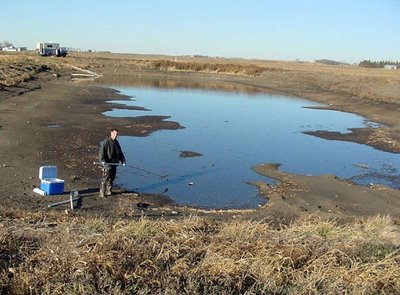Later than the latest homework assignment, more inadequate than the most half-hearted school project, the US’s upcoming climate change report is expected to disappoint climate scientists around the world.
The report, required by the United Nations Framework Convention on Climate Change, was due to the UN no later than January 1, 2006. Yes, 2006. Nonetheless, it is currently still under review by the White House Council on Environmental Quality.
According to the Council, the fourteen-month delay has been the result of an exhaustive review process. Skeptics, however, beg to differ. Rick Plitz, director of Climate Science Watch and a former senior associate of the federal Climate Change Science Program, hypothesizes that the postponement is largely because “the administration is reluctant to make an honest statement about likely climate change impacts on this country.”
This reluctance is rather understandable, given the degree of action that an honest assessment would necessitate. The UN’s own report, released last month, stressed more harshly than ever the drastic need for a significant worldwide reduction in greenhouse gas emissions. Although the US ratified the report, along with 112 other nations, the administration has yet to appropriately address the gravity of this news. The US’s current emissions policy calls for limiting the nation’s rate of increase to 19% – which still allows emissions to increase from 7.7 billion tons in 2000 to 9.2 billion tons by 2020.
This slowed rate of increase is simply not enough, according to Washington’s own Climate Institute. “We really need to be seriously reducing emissions, not just reducing the growth rate, as the president is doing,” says Michael MacCracken, the Institute’s chief scientist.
It’s easy to understand why the administration, and indeed, the American public, is hesitant to admit the decisive stance that is truly needed. After all, the greatest sources of greenhouse gases are coal, oil, and natural gas – the very fuels that support almost every aspect of the comfortable American lifestyle. Acknowledging the gravity of the true need for change is going to require a serious policy change from the government and citizens alike.
Both the U.S. Climate Change Science Program and the Climate Science Watch offer continued monitoring of the report’s progress, as well as further information on climate change in the political arena.
By Sara Kate Kneidel
keywords:: global warming, climate change, UN report, US greenhouse gas emissions
Showing posts with label US greenhouse gas emissions. Show all posts
Showing posts with label US greenhouse gas emissions. Show all posts
Tuesday, March 06, 2007
Friday, January 26, 2007
Weiners & Burgers Heating the Planet More than Cars
Animal farming is a bigger contributor of greenhouse gases and global warming than transportation is. So says a new report from the United Nations FAO or Food and Agricultural Organization.
Raising livestock accounts for 18% of all green-house gas emissions worldwide, including 9% of all carbon dioxide produced by human activities. Most of that CO2 is from the burning of forests for livestock pastures or to grow feed for farmed animals.
In addition, 37% of all methane due to humans is from livestock. Methane is 23 times more potent as a greenhouse gas, molecule for molecule, than CO2 is.
Farmed animals, says the FAO report, now comprise 20% of all land animals. The proliferation of animals we keep for meat, eggs, and milk is displacing and endangering wildlife species. The report says that 30% of land which is now occupied by livestock was at one time prime wildlife habitat. [It seems to me this figure should be closer to 100%.]
The FAO proposes, as a partial solution, that the true environmental costs inherent in animal agriculture should be passed along to livestock farmers. This would include the cost of attempting to restore habitats damaged by livestock, including the cleaning of rivers polluted by the liquid effluent from waste lagoons. The farmers then would be forced to pass those costs along to retailers and on to consumers. Sounds good to me.
But some costs can't be recouped. There is no technology to remove CO2 from the air, for example. I know this because my community has just had a couple of public hearings to consider our local power company's request to build more coal-fired power plants. That point was brought up again and again as I and others protested the construction: there is no technology to remove CO2 from the air. So the real solution to animal farming will have to be consuming fewer animal products. There is no other true fix.
Science News, January 13, 2007
Keywords:: GREENHOUSE GASES GLOBAL WARMING CLIMATE CHANGE ANIMAL AGRICULTURE FACTORY FARMING ANIMAL PRODUCTS FARMED ANIMALS TRANSPORTATION SUVS CARS TRUCKS EMISSIONS CARBON DIOXIDE BURNING FORESTS BURNING WOODLANDS PASTURES LIVESTOCK FEED ENVIRONMENTAL COSTS CONSUMER LIVESTOCK FARMER TRUE COSTS
Subscribe to:
Posts (Atom)


